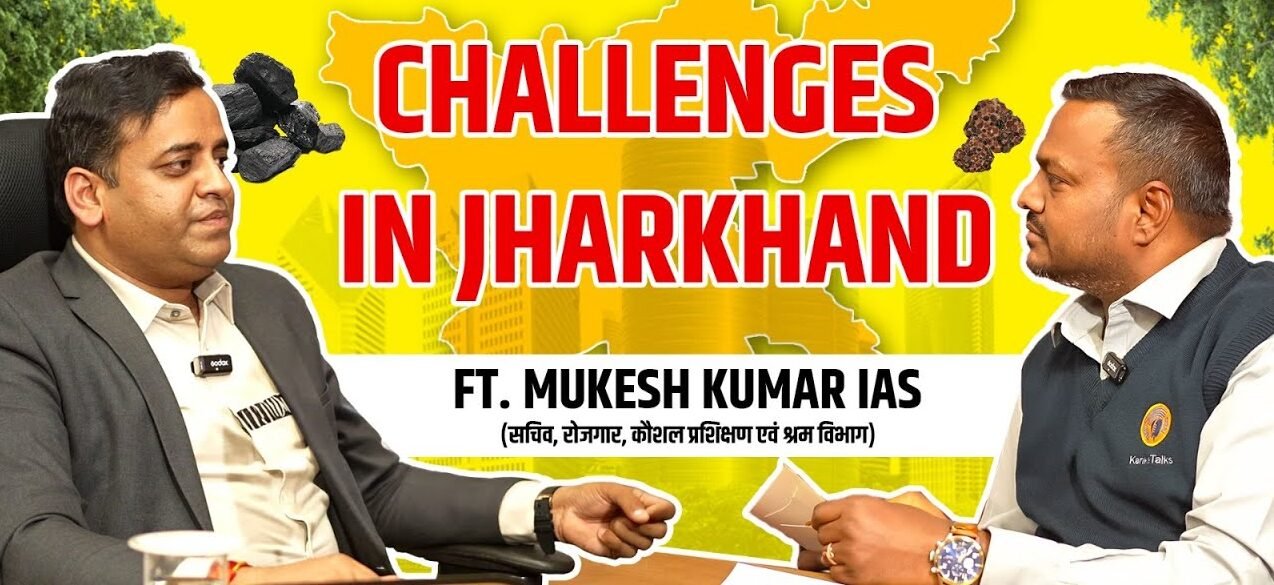“I wasn’t born with a plan to become an IAS officer. I became one because life, with all its uncertainties and detours, carved me into it.”
In an era where viral reels and glittering snapshots often blur the truth behind success, the story of Mukesh Kumar, IAS officer and Secretary of Labour, Employment, Training & Skill Development, Government of Jharkhand, stands out like a lighthouse—anchored in humility, faith, and fierce perseverance.
His life story, much like a tapestry, is stitched with threads of hardship, faith, literature, rebellion, and an unwavering commitment to public service.

The Seed of a Dream
Mukesh Kumar’s journey began in Patna, on the banks of the Ganges. Born into a modest yet value-rich household, he recalls one specific moment that quietly yet powerfully planted a seed. As a child, he once asked his father about a grand house facing Gandhi Maidan.
“That’s the District Collector’s residence,” his father had replied.
With the conviction only a child can muster, Mukesh promised himself: “One day, I’ll live there.”
What seemed like a fleeting wish turned out to be a prophecy. Not just because he wanted the position, but because he desired the power to bring meaningful change to people’s lives—something he would eventually do in more ways than one.
Battling Illness, Finding Purpose
After his 12th grade, Mukesh prepared for entrance exams in the field of Information Technology, dreaming of studying computer science at IIT Kanpur. But destiny had other plans.
A sudden and severe illness landed him in the hospital. Doctors gave up hope. He hovered on the edge between life and death. His dreams of cracking IET were temporarily crushed.
“I was bedridden for over six months. The physical pain was bad. But the psychological toll was worse.”
While many would have accepted defeat, Mukesh chose a different path. He took up Mathematics Honours—a subject that didn’t necessarily guarantee success, but did offer him structure and a mental lifeline.
A Scholar Shaped by Literature
Ironically, Mukesh’s real transformation came not through formulas, but through Hindi literature. In Patna, he was already known as a fiery debater. People admired his way with words. But it was his unexpected entry into a Hindi Literature coaching class that changed everything.
“I was there just to help a friend get enrolled,” he smiles. “But the teacher insisted I stay. He saw something in me.”
Eventually, what began as an accidental class turned into an obsession. Despite having a mathematics background, Mukesh pursued MA in Hindi Literature from JNU, where he topped the batch—a record yet to be broken.
Through literature, Mukesh didn’t just find a subject—he found a soul.
The Hindi Optional Gamble
With Hindi Literature as his optional subject in UPSC—an unconventional choice for many—Mukesh proved that you don’t need elite English-medium schooling or expensive coaching to make it.
“A poem by Premchand or a short story by Chekhov taught me more about society than any textbook.”
This deep understanding of human behavior, emotion, and societal nuance would later shape his administrative instincts. Because governance, at its core, is about people—and literature had prepared him to read them between the lines.
Service Before Self
Mukesh cleared the UPSC with 36th rank in his very first attempt and joined the 2009 IAS batch, Jharkhand cadre. But while his badge changed, his humility didn’t.
Over 15 years, he has worked in some of Jharkhand’s most difficult terrains—Latehar, Hazaribagh, Khunti, Pakur, Chatra—handling law and order, conducting historic bloodless elections in Naxal areas, and implementing welfare schemes with surgical precision.
“Jharkhand is beautiful, but difficult. The terrain is unforgiving. The diversity is a gift and a challenge.”
He speaks multiple dialects now—Mundari, Santhali, Angika, and more. He doesn’t just issue orders from air-conditioned offices; he learns, listens, and walks with the people.
Faith with Balance
One of the most moving aspects of Mukesh Kumar’s identity is his relationship with faith. A devout follower of Lord Shiva, he never shies away from sharing his spiritual side.
But he draws a clear line: his personal belief never clouds his public service.
“I wear a sacred thread, I visit temples. But my religion is mine alone. In my administrative decisions, I serve all equally.”
He speaks of Mahakaal, of energy, of visiting spiritual places not to show piety, but to recharge his spirit. His faith is not performative—it’s deeply personal.
Jharkhand: A Mosaic of Languages, Cultures, and Needs
As Secretary of Labour and Skill Development, Mukesh leads one of the most dynamic departments in Jharkhand. And he’s quick to point out that governance in Jharkhand is like decoding a multilingual poem.
“In one district alone, you may need to switch between Santhali, Hindi, Mundari, and Bengali.”
This diversity, he argues, should not just be preserved—it should be celebrated.
“Jharkhand is like a miniature India. Every language, every belief, every terrain is different. Good administration means adapting—not forcing a one-size-fits-all model.”
From JNU to Gig Workers: Always Ahead of the Curve
Mukesh’s understanding of society is not academic—it’s incredibly modern. He acknowledges the shift in employment models and actively works on policies for gig workers, those on-demand app-based professionals often left out of traditional welfare schemes.
He’s also driving futuristic skilling programs—AI, cybersecurity, foreign languages, and blockchain—to ensure that Jharkhand’s youth don’t just find jobs, but future-proof careers.
“Degrees are fine. But skills pay the bills. And today, a four-month coding course can sometimes beat a four-year BA.”
What Sets Him Apart
Mukesh Kumar is accessible. Approachable. And refreshingly grounded.
He listens attentively. When needed, he even signs papers on the bonnet of his car. Valuing people’s time is second nature to him. “If I can’t help you in 40 visits, then I’ve failed. But if I can help you in one visit, I must.”
He’s fiercely protective of public time and public money, often saying:
“The cost of delay is not just financial. It’s generational. A late road project isn’t just expensive. It may have cost a child their school, a farmer their market, or a patient their life.”
Real Over Reel
In the age of Instagram influencers at Lal Bahadur Shastri National Academy in Mussoorie, Mukesh reminds young aspirants:
“The IAS is not about selfies at the Academy. It’s about the sleepless nights in districts where no one comes.”
He encourages youth to step beyond the filmy fantasy of bureaucracy and step into its real, gritty, complex beauty.
The Legacy and the Lesson
When asked about the 25 years of statehood in Jharkhand and his role in it, he doesn’t boast. He reflects.
“We’re not just responsible for the Shukla Paksha—the bright phases. We’re accountable for the Krishna Paksha too—the shadows. We, the bureaucrats, must own both.”
He emphasizes that the public runs this country, not politicians or bureaucrats. “We are just instruments. The people are the force.”
For the Dreamers, the Doers, and the Doubters
To today’s aspirants, Mukesh offers no shortcuts. Just the truth.
“It’s okay to be raw. Stay unfinished. But stay hungry. Governance is not about ruling. It’s about reaching. If someone walks 40 km to meet you, don’t waste their journey.”
His message isn’t lofty. It’s actionable. He doesn’t promise ease. He offers meaning.
In Conclusion: The Power of the Pen and the Post
Mukesh Kumar’s life is not just a success story—it’s a story of soulful service.
From the child who stood outside the collector’s bungalow, dreaming of the impossible…
To the officer who now opens its gates to the masses, empowering them with dignity and purpose…
He is proof that the system can work—when people within it believe, serve, and never forget where they come from.

No responses yet